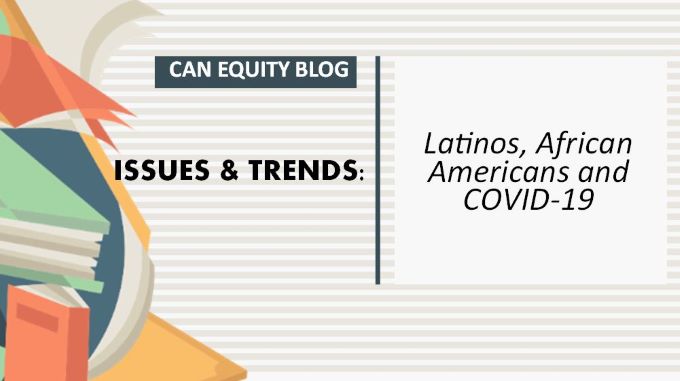
ISSUES & TRENDS: Latinos, African Americans and COVID-19
As you have heard or read in recent news media accounts, the impact of COVID-19 is different for different racial and ethnic groups. In several blog entries, we will be calling attention to the complexity of the issues that individuals who are part of racial/ethnic groups must confront on top of the need to keep themselves and their families and friends safe.
From a health standpoint, the CAN Dashboard Equity Analysis, notes health disparities for Blacks and Hispanics in the arenas of obesity, smoking, cardiovascular disease and diabetes. These are the types of underlying health conditions that exacerbate the impact that COVID-19 has on the human body. The prevalence of these health conditions affect life expectancies for these racial/ethnic communites, a fact that is being magnified in an alarming way through the COVID-19 pandemic.
If you look at the CAN Dashboard indicator page for Poverty, you also see that the proportion of Black and Hispanic individuals who live in poverty is much greater than the proportion of Whites that live in poverty. Families living in poverty have a much greater need to continue working because they don’t necessarily have cash savings on which to rely or jobs that provide sick leave. In fact, in the businesses that remain in operation (grocery stores, pharmacies, restaurants and businesses with an emphasis on deliveries), we see an overrepresentation of people of color in these low-wage jobs. Individuals with these kinds of employment are at a greater risk of contracting COVID-19 because of the added exposure that they have to the virus (resulting from an added exposure to people who patronize these businesses).
A recent report by LULAC (The League of United Latin American Citizens) entitled Latino Impact Report outlines more specifically: (i) the myriad risks encountered by Hispanics in the face of the COVID-19 pandemic; and (ii) priority areas that must be addressed and not overlooked if the government response to the COVID-19 crisis is to be comprehensive and equitable. The report outlines eight priorities in LULAC’s Plan for Combating Racial Disparities in the Government Response to COVID-19: Health; Our Children; Our Healthcare Workers; Our Labor Force; Our Economic Survival; Our Detained and Imprisoned; Access to Health Insurance; and Prescription Medicine; and Moratorium on Mortgage, Rent, Students Loans, and Foreclosures Without Penalties.
While each priority issue merits further discussion, I think that the outline of the priority areas themselves tell us a lot about the incredible breadth of impact of COVID-19 and the complexity of the response that is required. The LULAC report recommends that any pandemic response plan ensure that: local/federal governments are collecting and reporting data by race/ethnicity; critical information is provided in English and Spanish; undocumented immigrants working as essential workers be granted temporary protective status; Latinos are not underrepresented in medical trials for a COVID-19 vaccine; equal access to testing and treatment is provided to Latinos; adequate support and protections are provided to agricultural workers; Latinos are not left out of the stimulus program; and ICE releases minor detainees, releases detainees who are at elevated risk due to COVID-1 and stops all enforcement actions and deportations.
The NAACP recently published the report, Cornavirus Equity Considerations echoing the equity concerns for African-Americans that are similar to those issues outlined for Latinos in the LULAC report. While the NAACP report did highlight impacts to racial minorities, it also focused attention on other at-risk populations such as the elderly, people with disabilities, people experiencing homelessness and people who make very low incomes and who, under quarantine, may not able to work and provide for their families. In addition, the report points out: the challenges in health access for rural and Native American communities whose healthcare resources are much more limited and that can only be reached by traveling large distances; and elevated incidents of racism against and stigmatization of Asians and Asian American communities and LGBTQ individuals/communities.
In their report, the NAACP also offers a set of civil rights advocacy recommendations. It drives home the point that the federal government should provide new avenues of support like paid sick leave, unemployment insurance and paycheck protection AND ALSO expand financial support for federal programs providing vital services, like Social Security, Supplemental Nutritional Assistance and Temporary Assistance to Needy Families. The first COVID-19 stimulus package failed to expand these vital programs. The recommendations also highlighted the importance of advancing free universal broadband so that: students at all levels from K-12 to post-secondary can continue their learning; job-seekers can access information and resources; and individuals who seek safety and/or other health services or basic needs support can access those services.
The Coronavirus Equity Considerations report offers recommendations for addressing the myriad community challenges arising from the COVID-19 crisis: addressing racisms/xenophobia and stigma; supporting vulnerable populations and essential workers; minimizing education interruption and providing the added supports needed to ensure students are supported with their learning and basic needs such as food and housing ; defending democracy; ensuring broad access to health care and testing; and eliminating restrictive immigration policies. While the list of issues requiring attention and resources is daunting, the NAACP report also includes examples of how local communities are already working to address these challenges in promising ways.
In this time of great suffering, we must not only look out for ourselves. We must ensure that the government response and other public/private efforts to address challenges advance well-being for all. The NAACP notes that in additional to a fair and equitable response, “we must examine the systemic inequities that have exacerbate impact and ensure that we begin to enact transformational societal shifts to address the root causes of vulnerabilities and systems failure.”
Raul Alvarez, CAN Executive Director